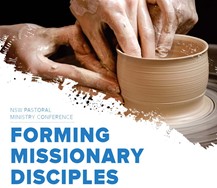A number of people from our Diocese travelled to Sydney to attend the Catholic Ministries Network Conference, Forming Missionary Disciples held last Tuesday (1 May). The purpose of the day was to explore this topic with others who are engaged in ministry. The keynote address was given by Fr Paul Roberts of the Diocese of Parramatta. His focus was on renewing our baptismal call and enabling our gifts in parish and school life.
 He began by naming and dealing with our ‘darkness’ from which he concluded that many people connected with the Catholic Church have faith in following the church instead of having their faith as followers of Jesus Christ. It appears to me that we are attempting to shift a people and their focus which means we are undergoing a cultural shift or realignment. I can’t help but think that we hear the words, and we understand what is being asked of us, but we are so immersed and ingrained in a way of being that the shift to be followers, disciples of Jesus Christ, leaves most of us struggling.
He began by naming and dealing with our ‘darkness’ from which he concluded that many people connected with the Catholic Church have faith in following the church instead of having their faith as followers of Jesus Christ. It appears to me that we are attempting to shift a people and their focus which means we are undergoing a cultural shift or realignment. I can’t help but think that we hear the words, and we understand what is being asked of us, but we are so immersed and ingrained in a way of being that the shift to be followers, disciples of Jesus Christ, leaves most of us struggling.
While preparing for a retreat day, based on Pope Francis’ Apostolic Exhortation, Evangelii Gaudium, the Joy of the Gospel, I came across once again paragraph 24 which speaks of being a community of missionary disciples. I cannot but include this paragraph as part of this week’s message for you to read, contemplate and invite others from your family, friends or parish into a conversation about what Pope Francis is saying and inviting us to join:
 The Church which “goes forth” is a community of missionary disciples who take the first step, who are involved and supportive, who bear fruit and rejoice. An evangelizing community knows that the Lord has taken the initiative, he has loved us first (cf. 1 Jn 4:19), and therefore we can move forward, boldly take the initiative, go out to others, seek those who have fallen away, stand at the crossroads and welcome the outcast. Such a community has an endless desire to show mercy, the fruit of its own experience of the power of the Father’s infinite mercy. Let us try a little harder to take the first step and to become involved. Jesus washed the feet of his disciples. The Lord gets involved and he involves his own, as he kneels to wash their feet. He tells his disciples: “You will be blessed if you do this” (Jn 13:17). An evangelizing community gets involved by word and deed in people’s daily lives; it bridges distances, it is willing to abase itself if necessary, and it embraces human life, touching the suffering flesh of Christ in others. Evangelizers thus take on the “smell of the sheep” and the sheep are willing to hear their voice. An evangelizing community is also supportive, standing by people at every step of the way, no matter how difficult or lengthy this may prove to be. It is familiar with patient expectation and apostolic endurance. Evangelization consists mostly of patience and disregard for constraints of time. Faithful to the Lord’s gift, it also bears fruit. An evangelizing community is always concerned with fruit, because the Lord wants her to be fruitful. It cares for the grain and does not grow impatient at the weeds. The sower, when he sees weeds sprouting among the grain, does not grumble or overreact. He or she finds a way to let the word take flesh in a particular situation and bear fruits of new life, however imperfect or incomplete these may appear. The disciple is ready to put his or her whole life on the line, even to accepting martyrdom, in bearing witness to Jesus Christ, yet the goal is not to make enemies but to see God’s word accepted and its capacity for liberation and renewal revealed. Finally, an evangelizing community is filled with joy; it knows how to rejoice always. It celebrates every small victory, every step forward in the work of evangelization. Evangelization with joy becomes beauty in the liturgy, as part of our daily concern to spread goodness. The Church evangelizes and is herself evangelized through the beauty of the liturgy, which is both a celebration of the task of evangelization and the source of her renewed self-giving.
The Church which “goes forth” is a community of missionary disciples who take the first step, who are involved and supportive, who bear fruit and rejoice. An evangelizing community knows that the Lord has taken the initiative, he has loved us first (cf. 1 Jn 4:19), and therefore we can move forward, boldly take the initiative, go out to others, seek those who have fallen away, stand at the crossroads and welcome the outcast. Such a community has an endless desire to show mercy, the fruit of its own experience of the power of the Father’s infinite mercy. Let us try a little harder to take the first step and to become involved. Jesus washed the feet of his disciples. The Lord gets involved and he involves his own, as he kneels to wash their feet. He tells his disciples: “You will be blessed if you do this” (Jn 13:17). An evangelizing community gets involved by word and deed in people’s daily lives; it bridges distances, it is willing to abase itself if necessary, and it embraces human life, touching the suffering flesh of Christ in others. Evangelizers thus take on the “smell of the sheep” and the sheep are willing to hear their voice. An evangelizing community is also supportive, standing by people at every step of the way, no matter how difficult or lengthy this may prove to be. It is familiar with patient expectation and apostolic endurance. Evangelization consists mostly of patience and disregard for constraints of time. Faithful to the Lord’s gift, it also bears fruit. An evangelizing community is always concerned with fruit, because the Lord wants her to be fruitful. It cares for the grain and does not grow impatient at the weeds. The sower, when he sees weeds sprouting among the grain, does not grumble or overreact. He or she finds a way to let the word take flesh in a particular situation and bear fruits of new life, however imperfect or incomplete these may appear. The disciple is ready to put his or her whole life on the line, even to accepting martyrdom, in bearing witness to Jesus Christ, yet the goal is not to make enemies but to see God’s word accepted and its capacity for liberation and renewal revealed. Finally, an evangelizing community is filled with joy; it knows how to rejoice always. It celebrates every small victory, every step forward in the work of evangelization. Evangelization with joy becomes beauty in the liturgy, as part of our daily concern to spread goodness. The Church evangelizes and is herself evangelized through the beauty of the liturgy, which is both a celebration of the task of evangelization and the source of her renewed self-giving.
I hope you are grabbed by the intensity of this message from Pope Francis. It provides us with the ‘formula’ to be missionary disciples, encapsulating both the gospel reading from last week about the vine and the branches and the readings of this week about ‘God is love’ from the first letter of St John and then in the Gospel of John (15: 9-17):
I call you friends, because I have made known to you everything I have learnt from my Father. You did not choose me, no, I chose you; and I commissioned you to go out and to bear fruit, fruit that will last; and then the Father will give you anything you ask him in my name. What I command you is to love one another.
 Last Saturday, I met with the Diocesan Council for Ministry with Young People (DCMYP) where we discussed going out on mission as missionary disciples. There are small pockets of ministries with young people in parishes and schools around our Diocese and the members of the DCMYP wish to go out and connect with those who are sowing the seeds of faith with, and for, young people. I then went to the monthly L’Arche gathering, where I was reminded about the importance of washing the feet of those people you serve and also call friends. Those who had been nominated and accepted positions on the Community Council washed the feet of some of the members of the Hunter community, to ritualise their role as servant leaders to the people who are part of this community. I recall the name of “Friends of L’Arche” and that is what Jesus is saying to his disciples, to us, that we are no longer servants but friends because he has revealed to us what it means to be truly human. L’Arche is a movement with friendship as its core ingredients. I feel at home with them as they show real care for each other.
Last Saturday, I met with the Diocesan Council for Ministry with Young People (DCMYP) where we discussed going out on mission as missionary disciples. There are small pockets of ministries with young people in parishes and schools around our Diocese and the members of the DCMYP wish to go out and connect with those who are sowing the seeds of faith with, and for, young people. I then went to the monthly L’Arche gathering, where I was reminded about the importance of washing the feet of those people you serve and also call friends. Those who had been nominated and accepted positions on the Community Council washed the feet of some of the members of the Hunter community, to ritualise their role as servant leaders to the people who are part of this community. I recall the name of “Friends of L’Arche” and that is what Jesus is saying to his disciples, to us, that we are no longer servants but friends because he has revealed to us what it means to be truly human. L’Arche is a movement with friendship as its core ingredients. I feel at home with them as they show real care for each other.
And this takes me to the final message from Francis Sullivan who this week concluded his role as CEO of the Catholic Church’s Truth, Justice and Healing Council after more than five years co-ordinating the Catholic Church’s response to the Royal Commission into Institutional Responses to Child Sexual Abuse. He notes that “this scandal has been a real wake up call for me and I hope from my Church”. He goes on to say:
What is clearer to me these days is that the leadership of the Church has never been more aware of the crisis the Church faces and never more aware of what needs to be done to rebuild faith and trust that is at an all-time low. So many leaders tell me that they want to reconcile with survivors and restore their trust in the Church.
The resolve must be to bring about change in our Catholic Church. That institutional change must start with people at all levels. Francis Sullivan uses the words, “creative disruptor” which will renew, reinvigorate and regenerate the essence of being Church.
He finishes his final message with these words:
 None of us gets things right all the time. Yet most of us can sense when sincerity and generosity of heart are at play. It is this well of human compassion that becomes the redemptive, restorative and ultimately the healing place for those who seek it.
None of us gets things right all the time. Yet most of us can sense when sincerity and generosity of heart are at play. It is this well of human compassion that becomes the redemptive, restorative and ultimately the healing place for those who seek it.
When we look back, will we see changes to governance within Church structures and processes, a truly national redress scheme, markedly different approaches by church authorities to civil litigation claims, an increased role for women and the laity more generally in the Church, the support for Catholic Professional Standards Ltd. and its public accountability of leaders, a reformed seminary system and the proper professional supervision of clergy and lay personnel?
My sense is that we will. This scandal has rocked the foundations of my Church so profoundly that the instinctive spirit to seek goodness, truth and beauty that binds us as a faith community will ultimately prevail.
We must hold onto the core of all of this which is our faith. As missionary disciples, we are called to share this faith and to grow this faith in our daily interactions.

